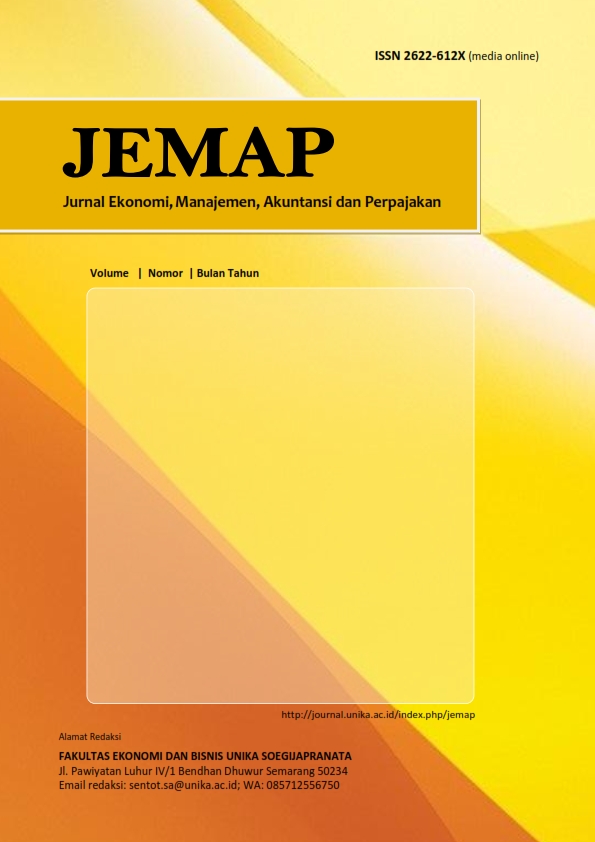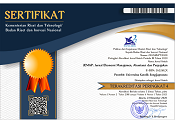Pengaruh Kenaikan Cukai Rokok Tembakau Dan Penghasilan Terhadap Perilaku Merokok Di Malang
Abstract
The government has decided to increase cigarette excise rates by 10% as of January 2024. This decision is inseparable from the aim of reducing the level of cigarette consumption in Indonesia. The purpose of this study was to determine the effect of increasing cigarette excise and income on smoking behavior. This study involved 104 respondents from the Malang Regency and City community who consumed cigarettes to fill out a questionnaire that was distributed directly or indirectly. The data analysis technique in the form of the McNemar test aims to determine the effect of increasing cigarette excise rates on smoking behavior, while the binary logistic regression test is to determine the effect of income on smoking behavior. Overall, respondents have filled out the questionnaire completely. Most respondents who smoke ≥ 15 cigarettes per day did not reduce the number of cigarettes they consumed per day, while only 11 people reduced it to <15 cigarettes. Then, respondents at income levels of 1,000,000-2,000,000 and 2,000,001-3,000,000, preferred not to reduce their cigarette consumption after the increase in cigarette excise rates. The increase in cigarette excise rates can reduce cigarette consumption in Malang society. For further research, it is expected to expand the scope of the research so that the results obtained can be more diverse.
Keywords
Full Text:
PDF (Bahasa Indonesia)References
Badan Pusat Statistik. (2022). Persentase Penduduk Usia 15 Tahun Ke Atas yang Merokok dalam Sebulan Terakhir Menurut Kabupaten/Kota dan Kelompok Umur di Provinsi Jawa Timur, 2021. Badan Pusat Statistik Provinsi Jawa Timur. https://jatim.bps.go.id/id/statistics-table/1/MjM5MiMx/persentase-penduduk-usia-15-tahun-ke-atas-yang-merokok-dalam-sebulan-terakhir-menurut-kabupaten-kota-dan-kelompok-umur-di-provinsi-jawa-timur-2021.html
Guo, Q., Unger, J. B., Azen, S. P., MacKinnon, D. P., & Johnson, C. A. (2012). Do cognitive attributions for smoking predict subsequent smoking development? Addictive Behaviors, 37(3), 273–279. https://doi.org/10.1016/j.addbeh.2011.11.002
IAKMI. (2020). ATLAS TEMBAKAU INDONESIA 2020. Tobacco Control Support Center-Ikatan Ahli Kesehatan Masyarakat Indonesia (TCSC-IAKMI).
Kotler, P., & Keller, K. L. (2009). Mana}emen Pemasaran (13th ed.). Jakarta: Penerbit Erlangga.
Makarim, M. M., & Purwana, A. S. (2022). KENAIKAN DAN PENYEDERHANAAN TARIF CUKAI UNTUK MENURUNKAN PENGELUARAN KONSUMSI ROKOK DAN PREVALENSI PEROKOK REMAJA. JURNAL INFORMASI, PERPAJAKAN, AKUNTANSI, DAN KEUANGAN PUBLIK, 17(1), 57–78. https://doi.org/10.25105/jipak.v17i1.9284
Nguyen, A., & Nguyen, H. T. (2020). Tobacco excise tax increase and illicit cigarette consumption: Evidence from Vietnam. Tobacco Control, 29(Suppl 4), s275–s280. https://doi.org/10.1136/tobaccocontrol-2019-055301
Qattan, A. M. N., Boachie, M. K., Immurana, M., & Al-Hanawi, M. K. (2021). Socioeconomic Determinants of Smoking in the Kingdom of Saudi Arabia. International Journal of Environmental Research and Public Health, 18(11), 5665. https://doi.org/10.3390/ijerph18115665
Ravie, A., Prakoso, H. A., & Prasodjo, H. (2023). DILEMA INDONESIA DALAM RATIFIKASI FRAMEWORK CONVENTION ON TOBACCO CONTROL TERHADAP INDUSTRI ROKOK NASIONAL. REFORMASI, 13(1), 48–63. https://doi.org/10.33366/rfr.v13i1.3983
Visscher, K., Everaars, B., Suijkerbuijk, A. W., Lambooij, M., & De Wit, G. A. (2023). Intended changes in smoking behaviour of Dutch young adults after an increase in excise tax: A cross-sectional survey. BMJ Open, 13(12), e065535. https://doi.org/10.1136/bmjopen-2022-065535
Wandita, D. T. (2020). PENGARUH CUKAI ROKOK TERHADAP KONSUMSI ROKOK SERTA FAKTOR- FAKTOR YANG MEMPENGARUHI KONSUMSI ROKOK. 14.
World Health Organization. (2020). Raising Tobacco taxes and Prices for A Healthy and Prosperous Indonesia.
DOI: https://doi.org/10.24167/jemap.v8i1.12931
Refbacks
- There are currently no refbacks.
e-ISSN 2622-612X | View My Stats







